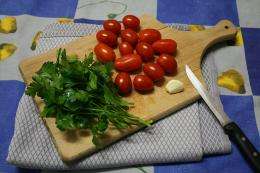Low-fat diet may help some women beat breast cancer, study suggests

Almost anyone would benefit by reducing the amount of fat in their diet. But the upside could be especially big for women with breast cancer.
New research presented Friday at the San Antonio Breast Cancer Symposium suggests that a low-fat diet may extend the lives of some women with the disease.
The preliminary findings are based on data from early-stage breast cancer patients who volunteered for the Women's Intervention Nutrition Study. All of the women had surgical treatments and were continuing with various combinations of hormone therapy, chemotherapy and radiation, depending on the characteristics of their tumors.
Among the 2,437 study participants, 975 were randomly assigned to revamp their diets. The goal was to get only 15 percent of their calories from fat, and to help them in this mission they received eight individual counseling sessions over 16 weeks, followed by check-ins with dietitians once every three months. The other 1,462 women in the study served as controls.
Before the study began, women in both groups were getting an average of 29.6 percent of their calories from fat. Six years later, the women in the low-fat diet group had reduced that figure to 23 percent, while their counterparts in the control group crept up to 31.4 percent. (The women who cut back on fat also lost about 6 pounds, on average.)
The possible benefits of cutting back on fat were apparent after five years, the researchers reported. The mortality rate for women in the low-fat diet group was 6.6 percent - nearly 10 percent lower than the 7.3 percent mortality rate for women in the control group, researchers reported.
The longer the women were tracked, the more the gap grew. After a median of 8.1 years, the mortality rate for those eating less fat was 9.1 percent - 18 percent lower than the 11.1 percent mortality rate for those in the control group. And through 2013, the mortality rates for the two groups were 13.6 percent and 17 percent; that amounted to a 20 percent reduction for women eating less fat.
None of these differences were big enough to be considered statistically significant. But when the researchers focused only on women whose cancers lacked receptors for the hormone estrogen, the death rate for women on low-fat diets was 36 percent lower than for women on the regular diets. That gap was too big to be due to chance.
Then the researchers zeroed in on women whose cancers lacked receptors for both estrogen and progesterone. They found the mortality rate was 56 percent lower for women on the low-fat diet than for women in the control group.
The researchers didn't know whether the women's tumors were HER2-positive or HER2-negative. (HER2-positive cancers have a faulty HER2 gene that causes breast cells to grow out of control.) But the researchers said some of the women with ER-negative and PR-negative cancers were probably negative for HER2 as well. These "triple-negative" breast cancers are difficult to treat because they don't respond to drugs like tamoxifen or Herceptin. So a lifestyle intervention that might improve survival for women with these cancers is especially welcome, the researchers said.
The study was conducted by researchers from the Los Angeles Biomedical Research Institute at the Harbor-UCLA Medical Center and Beth Israel Deaconess Hospital in Boston. The work was funded by the National Cancer Institute and the American Institute of Cancer Research.
©2014 Los Angeles Times
Distributed by Tribune Content Agency, LLC















